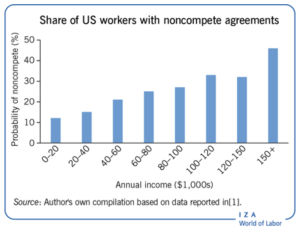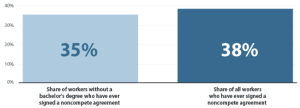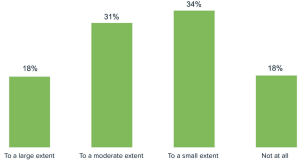After two years’ spent debating the issue (and receiving more than 26,000 public comments on the matter), the Federal Trade Commission (FTC), has done what many expected it would – come out in favor of banning non-compete agreements.
According to the FTC, these underhand employer devices not only stifle wages, but they limit innovation; and even prohibit the free movement of people to take their skills to new employers. It’s time – it says – that they went, and went away for good.
Data suggests the FTC is certainly not wrong in its assessment of these documents.
Numerically, around 30 million American workers are thought to be under the umbrella of non-compete agreements – and as such, it is argued they suppress wages by around $524 a year by preventing staff from being able to move to better paid jobs being offered by competitors in similar fields.


Source: https://www.americanprogress.org/article/the-freedom-to-leave/
It has also been suggested that around 8,500 new start-ups could be created every year if non-competes are banned.
As Lina Khan, FTC chair says: “Non-compete clauses keep wages low, suppress new ideas, and rob the American economy of dynamism…they constitute unfair methods of competition.”
What now?
The big question for CHROs, of course, is ‘what now?’
“Businesses are going to get built and destroyed because of this rule,” predicts Laura Pollock, founder of Third Street Partners, a boutique executive talent firm that specializes in investment managers. Quoted in The Financial Times, she said: “This is the beginning of real change.”
We already know that the US Chamber of Commerce has filed a lawsuit alleging that the FTC is overstepping its authority. On top of this, it is expected that legal challenges will follow. So one thing is for certain: a lengthy court battle awaits.
According to one analyst, the purpose of non-competes is to allow any sensitive information to go, as he puts it, “stale” – that is fresh market information (and that which is useful to competitors and constitutes proprietary information), should be allowed to become out of date before any other employer can hire someone.
But while the FTC does include an exception for what it calls “senior executives,” this is only retroactive. Furthermore, the regulator defines this cadre of workers as those making more than $151,164 a year, and who are also in “policy making positions”. New non-compete agreements, for any level of employee, are prohibited.
But…could is mere threat of a ban already changing behavior?
What’s interesting though, is that now that the FTC’s ruling is out, what we may see is companies pre-emptively changing their behavior in advance of the likely long and protracted legal shenanigans – because what they really need is certainty.
In other words, if non-competes are now so much in the spotlight (and subject to over-growing criticism), even if the FTC’s rule is overturned, companies might simply decide to start to do away with them anyway, to avoid being caught up in any reputational dramas (New York state already has).
To some degree, there is evidence this is already happening.
Law firm, Littler, releases its 12th Annual Employer Survey on May 8, but has given TLNT exclusive access to it.
One of its questions – which went to more than 400 in-house lawyers, C-suite executives and HR professionals – was the extent to which they might be impacted by expected legislative and regulatory efforts, including moves by the FTC to limit non-compete agreements.
What it found was nearly two-thirds of respondents who currently utilize non-compete agreements say they will now either moderately (31%) or will be slightly less likely (34%), to use them due to recent legislative and regulatory activity.
Only 18% said it would make no difference to them at all. See chart below:
CHART: To what extent have attempts to restrict non-compete agreements made you less likely to use them?

This research was compiled prior to the FTC ruling, but the very fact non compete were already being talked about was enough to frighten companies off from continuing to use them – and one can only assume this will increase now the actual ruling is out.
Speaking exclusively to TLNT, James Witz, Littler shareholder and co-chair of the firm’s Unfair Competition and Trade Secrets Practice Group, said: “With ongoing uncertainty around the future of non-compete agreements, our survey found many employers adopting a ‘wait-and-see’ approach to their use of such agreements.
He continued: “Given the delays around the FTC’s rule and that it is likely to face immediate legal challenge, many employers have been waiting for further clarity before shifting their approach to using non-compete agreements.”
Added Melissa McDonagh, Littler shareholder and co-chair of the firm’s Unfair Competition and Trade Secrets Practice Group: “Employers concerned about the FTC rule and broader legislative and regulatory efforts to restrict the use of non-compete agreements may look to other options to protect their confidential information and business relationships. This could include non-disclosure and non-solicitation agreements, though it’s still important to ensure that those agreements comply with local, state and federal laws.”
So, while the machinations of the FTC’s decision are likely to play out in the courts for at least another couple of years, CHROs will now need to ask themselves this very important question: is it better to start drifting away from non-competes now, rather than wait for some far-off decision?
If other companies are already doing this, they may be forced to act anyway.
What the data says:
- Research by Gartner finds many organizations actually see benefits to a ban on non-competes. These include access to a larger pool of skilled workers (72%), improved competition for talent (48%) and greater workplace diversity (46%).
- 98% of private companies expect at least some of their staff to sign up to non-compete agreements (source: Forbes)
- Researchers from the University of Maryland and the University of Michigan have found that workers who are first asked to sign a non-compete agreement after accepting a job are 12.5% less satisfied in their job and experience no wage and training benefits relative to non-signers.
- Around 18% of American workers are bound by non-competes.
- The FTC estimates that banning non-competes would increase worker earnings by more than $300 billion per year, saving consumers up to $148 billion on health costs each year.
- Researchers also argue that banning non-competes nationwide would close racial and gender pay gaps by between 3.6-9.1%.
